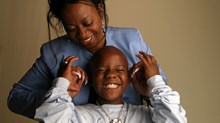Career Clash
We moved once, and everything worked out. Why not again?
Keith's Side:
I've always wanted to be a surgeon. The day I got accepted into medical school was one of the happiest of my life. After medical school, I began a grueling seven-day-a-week surgical residence at a large medical center in Chicago, where the demands of the six-year residency were high.
I'd met Jennifer just before beginning my residency. She was practicing law in Pennsylvania. We fell in love, and two years later we got married. Jennifer joined me in Illinois and landed a good job. Unfortunately, my work schedule didn't afford us much time together. This was frustrating, but still we worked hard at our new marriage. Three years later, we were blessed with the arrival of our daughter, Jessica. Despite the increased demands on our time and energy levels, Jennifer and I continued to balance our careers, parenting, and social life fairly well.
As my residency neared completion, I realized that to become a trauma surgeon I'd have to extend my training to include a one-year trauma fellowship. I knew Jennifer wouldn't be thrilled, particularly because it meant moving to another state. But, after investing so many years into my training, what was one more year?
The news hit Jennifer like a brick. She balked at the idea of leaving Illinois and all she had worked toward. Frankly, I didn't fully understand her resistance toward moving. After all, God had been faithful to provide for her needs when she moved to Illinois, and he would do so once again. Whenever we discussed the topic, the conversation was strained and tear-filled.
Why should I give up my career—one more time?
Jennifer's Side:
After graduating from law school, I landed a dream job working as a civil litigator in a large firm in Harrisburg, Pennsylvania. Shortly after that, I met Keith and came to believe that he was the man God intended for me to marry. Because of my love for him, I offered to quit my job and join him in Illinois. Leaving family, friends, and church behind was difficult, as was moving to a state where I was not licensed to practice law.
Keith's work schedule was also tough on me. He was gone a lot of the time, and when he was home, he was usually tired. I worked hard to make new friends and get involved at our church. And within our first year of marriage, I became licensed and secured a job as an attorney with the State of Illinois. We needed my income to meet expenses. I enjoyed the work, and after our daughter was born, I was able to work out of our home.
When Keith told me that he had to do additional training out-of-state, I was devastated. Moving has always been tough for me, and Illinois was already the sixth state I had lived in. I proposed that he move alone and fly home on the weekends. After all, why should I have to sacrifice what I had worked so hard for again? Why was his career goal more important than mine? And how would we meet our expenses without my income? I loved Keith and was committed to our marriage, but this was too much.
What Keith and Jennifer Did:
Keith and Jennifer searched for a solution to their dilemma together. Through prayer, the Holy Spirit reminded them that their marriage covenant required that they find a workable solution.
"I prayed for a change of heart and for the ability to take seriously the call to submission," Jennifer said. Keith looked for ways to make the move more tolerable. Finding out which hospitals offered the fellowship he needed, he and Jennifer would choose the location of the move together. They mutually agreed on Miami. There, Keith would get excellent training, and Jennifer would get to live near one of her sisters.
Since Jennifer was not licensed to practice law in Florida, and she was expecting their second child, the Clancys realized it would be practically impossible for her to work outside the home that year. They knew finances would be tight. To help meet expenses, Keith agreed to moonlight after regular hours in the emergency room. In turn, Jennifer agreed to manage the child-rearing and household responsibilities while Keith was away from home.
After moving, the Clancys made a priority of finding a local church in which they could worship and develop friendships together. This would provide a support network for their marriage.
Despite a busy work schedule, Keith decided to spend more quality time with the family. Although Jennifer missed the challenges of legal work, she appreciated her at-home role at this time.
"The Lord impressed upon my heart that my identity and self-worth are found first and foremost in being one of his children (John 1:12), and not in my career," Jennifer recalls. God also taught her that raising their children was a full-time privilege (Ps. 127:3–5; Prov. 22:6). Keith encouraged Jennifer by reminding her that God was unfolding another chapter of her life, and she could trust his direction.
Drawing on lessons already learned in their married life, namely, the importance of prayer, communication, self-sacrifice, and adaptability, Keith and Jennifer were able to work together toward moving again. With his fellowship completed, Keith restricted his job search to Pennsylvania and Illinois, the states when Jennifer was already licensed. God provided him with a great job opportunity in Pittsburgh. Together with their two daughters, they look forward to investing themselves into their new surroundings.
If you know a couple with a creative solution to a common marriage problem, let us know. We'll pay $50 for each story that is featured in this column. Send the couple's name, phone number, and a short description of their problem and solution to:
Marriage Partnership
465 Gundersen Drive
Carol Stream, Illinois 60188
e-mail: mp@marriagepartnership.com
Copyright © 2000 by the author or Christianity Today/Marriage Partnership magazine. Click here for reprint information on Marriage Partnership.
Read more articles that highlight writing by Christian women at ChristianityToday.com/Women
 Read These Next
Read These Next


 The Secret to ContentmentWhen Joyce Meyer took a risk to love and be loved, she discovered something deeper than happiness.
The Secret to ContentmentWhen Joyce Meyer took a risk to love and be loved, she discovered something deeper than happiness.
 Raising Strong Christian Boys5 ways I’m building up my sons’ character
Raising Strong Christian Boys5 ways I’m building up my sons’ character








 Homepage
Homepage